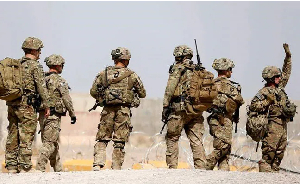- Home - News
- TWI News | TV
- Polls
- Year In Review
- News Archive
- Crime & Punishment
- Politics
- Regional
- Editorial
- Health
- Ghanaians Abroad
- Tabloid
- Africa
- Religion
- Election 2020
- Coronavirus
- News Videos | TV
- Photo Archives
- News Headlines
- Press Release
General News of Tuesday, 7 February 2006
Source: Chronicle
Police Caught In Highway Robbery
It was terrifying and tiresome when The Chronicle embarked on an all-night investigations into the naked acts of robbery perpetrated by some personnel of the Ghana Police Service on drivers and dealers of timber boards plying the Techiman-Tamale and Bolgatanga-Bawku highways (T2 B2), having received several reports from the dealers at the Techiman Timber Market about alleged extortions by the police.
The investigations, which began on Sunday January 22, this year at about 8:00 a.m. and ran through the night into the next day, confirmed the complaints, and The Chronicle can evidently say the police, who are supposed to prosecute corrupt persons, were rather caught in the act. At all the police barriers along the T2 B2 highways, the police charged a flat rate from the wood dealers, before they were allowed to cross to their destinations. The Chronicle, in its bid to unearth the truth behind the reported extortions, on that fateful day, decided to join a Bawku-bound truck, loaded with sawn boards. The first point of call was the Techiman police barrier, located at Takofiano, just in front of the Techiman Municipal Police Headquarters, a few meters from the Techiman-Tamale station.
Here, the truck stopped and the owner of the sawn timber and his other colleagues went to the police, with this reporter in disguise, and there, the business transactions began. The police demanded ?150,000 for each of the three cargo trucks and ?300,000 for the one articulated truck carrying the boards to Tamale, making a total amount of ?750,000. These flat charges on each truck did not go down well with the dealers, as the police could not produce a receipt to that effect, resulting in a heated argument. The sawn timber dealers insisted they were not going to pay the amount demanded by the police but were prepared to pay ?50,000 per truck and ?100,000 for the articulated truck.
Whilst this verbal confrontation was going on, the Municipal Police Commander in Techiman was sitting unconcerned. One of the dealers managed to approach him, pleading that he allowed his men to take the ?50,000, because business was slow. One of the officers retorted that if business was slow, then the dealers better quit, as they claimed to be making nothing in profits.
Finally, on the instructions of the commander, the trucks were ordered to pass, having accepted the payment terms of the wood dealers. The situation was no different at the other police barriers, numbering about 15 from Techiman to Bawku; three in Brong Ahafo, four in the Northern Region, five in the Upper East Region, all demanding ?150,000 per cargo truck and ?300,000 per articulated truck, except at the Fulfulso barrier in the Northern Region, which the dealers described as the most difficult barrier. Here, the flat rates were ?300,000 per cargo and ?600,000 per articulated truck.
At the Fulfulso barrier, this reporter queried the police for taking so much from the dealers and whether they could provide receipts to justify it. On realizing that there was a reporter with the dealers, the officers said their boss was at the Tamale entry point at Fulfulso and they would accompany the dealers to streamline issues with him. From all indications, the police personnel at this barrier had sent messages to alert their colleagues at other barriers along the route, of the presence of this reporter among the dealers, which made them desist from what they usually did, ? extortion- to the amazement of the wood dealers.
At a particular checkpoint at the Airport Junction in Tamale, the MTTU personnel there could not ask for money but still used one of their numerous tricks on the driver of the Bawku-bound truck in which this reporter was traveling. They accused the driver of carrying excessive number of passengers and demanded his driving license. After taking the license, they asked him to appear before a court in Tamale on Friday, January 27th. But on return from Bawku, this reporter went to the MTTU boss, Mr. Aklutse, to complain about the behaviour of his men on the road and the license was returned.
When the Northern Regional Police Commander, ACP Barakatu, was contacted on the issue, he confirmed these practices, saying that sometime ago, the police authorities had a meeting with the dealers about these extortions. According to the Northern Regional Police boss, the dealers were told to report any extortion to him, but added that since he was not getting any complaints from the timber dealers, he assumed everything was well with them. The Police boss was not happy about the fact that his men were extorting money from drivers, including the dealers on the way, contrary to the laws of this country. He assured the public that he would do everything possible to check this unfortunate habit. Mr. Barakatu said that his outfit would withdraw most of the men from the road to ensure sanity.
Another unfortunate incident experienced by The Chronicle was at the Zourugu Customs check point, where a Customs Officer, Godwin Tsagali, and his assistant demanded ?150,000 from the cargo truck loaded with sawn timber. When this reporter enquired about the reason for taking the money, he ordered him out of his office and said, ?I don?t care whether you are a journalist or not; you can put me on your front page.? He also added, ?Do you know how I manage to eat?? The dealers, later in an interview with The Chronicle, appealed to the IGP and Minister for the Interior to intervene, as they were the only suppliers of timber boards to the Northern sector of this country.
According to them, the unprofessional activities of the police on the roads were causing high losses to the sawn timber industry in the northern sector. They disclosed that before they took off from the Techiman Timber Market, they paid for a VAT receipt, a waybill from the GPRTU and the Techiman Municipal Assembly revenue receipt. They complained that they paid at least two to three million cedis extra, depending on their final destination.










